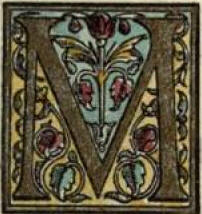|
 ALLENY
was for long in the possession of a family of Scotts—scions of the house
of Buccleuch, Laurence Scott being one of the principal Clerks of
Session in the reign of James VI. and I. In 1882 it was sold to Lord
Rosebery by Lieut.-Col. F. C. Scott, C.B. It is one of those country
seats which the growth of Edinburgh has caused to become suburban in its
environment, but it remains delightfully secluded, screened by woodland
containing some magnificent sycamores. Unluckily I did not visit it
until the late tenants, Sir Thomas and Lady Gibson-Carmichael, had
resigned their lease from Lord Rosebery, to whom this place belongs, on
Sir Thomas being appointed Governor of Victoria. Thus I missed seeing
the garden as it should have been seen, for it was Lady Carmichael's
care to fill with bright flowers the framework of quaintly clipped yews
which are the legacy of bygone generations, while Sir Thomas had
enriched all parts of the grounds with weird creatures wrought in metal,
in designing and executing which he has earned such a high reputation.
Flowers there were still, but not in the luxuriance of former seasons,
and the metal work had nearly all been removed. In one respect Malleny
is a model for other mansions, especially in Scotland, where modern
architects have been allowed too often to banish the flower-garden to an
exorbitant distance from the dwelling-house. Here you step from the
ivy-grown house direct among the borders, and all the fleeting phases of
the season may be enjoyed from the windows. Thus it should ever be in
any garden worthy of the name; and thus it seems to have struck Lord
Cockburn, who, writing in 1846, mentions Malleny as one of five curious,
old-style gardens remaining in Midlothian. "They are all," he said,
"sadly injured now. Except Hutton, they were all small and of the same
character—evergreen bushes, terraces, and carved stones." ALLENY
was for long in the possession of a family of Scotts—scions of the house
of Buccleuch, Laurence Scott being one of the principal Clerks of
Session in the reign of James VI. and I. In 1882 it was sold to Lord
Rosebery by Lieut.-Col. F. C. Scott, C.B. It is one of those country
seats which the growth of Edinburgh has caused to become suburban in its
environment, but it remains delightfully secluded, screened by woodland
containing some magnificent sycamores. Unluckily I did not visit it
until the late tenants, Sir Thomas and Lady Gibson-Carmichael, had
resigned their lease from Lord Rosebery, to whom this place belongs, on
Sir Thomas being appointed Governor of Victoria. Thus I missed seeing
the garden as it should have been seen, for it was Lady Carmichael's
care to fill with bright flowers the framework of quaintly clipped yews
which are the legacy of bygone generations, while Sir Thomas had
enriched all parts of the grounds with weird creatures wrought in metal,
in designing and executing which he has earned such a high reputation.
Flowers there were still, but not in the luxuriance of former seasons,
and the metal work had nearly all been removed. In one respect Malleny
is a model for other mansions, especially in Scotland, where modern
architects have been allowed too often to banish the flower-garden to an
exorbitant distance from the dwelling-house. Here you step from the
ivy-grown house direct among the borders, and all the fleeting phases of
the season may be enjoyed from the windows. Thus it should ever be in
any garden worthy of the name; and thus it seems to have struck Lord
Cockburn, who, writing in 1846, mentions Malleny as one of five curious,
old-style gardens remaining in Midlothian. "They are all," he said,
"sadly injured now. Except Hutton, they were all small and of the same
character—evergreen bushes, terraces, and carved stones." |

